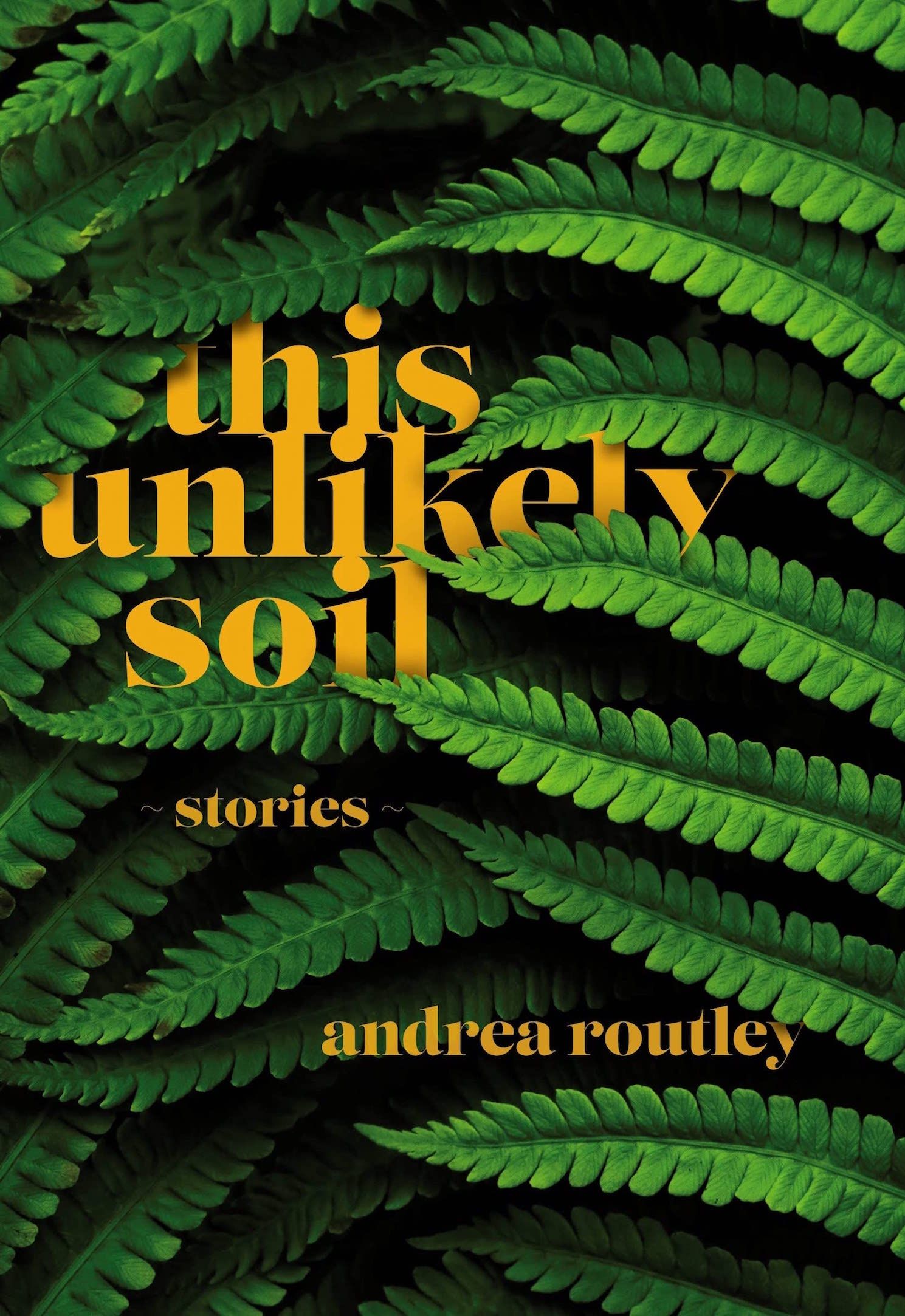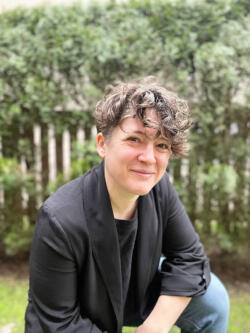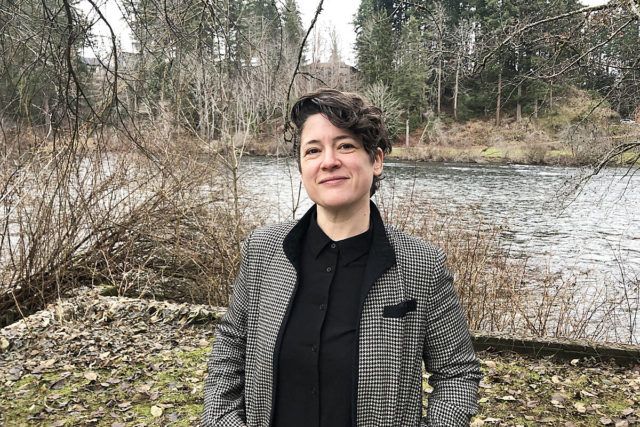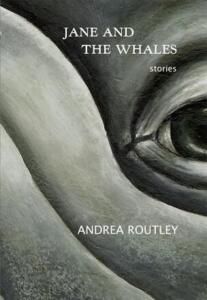1746 Much grows in shadow
This Unlikely Soil
by Andrea Routley
Qualicum Beach: Caitlin Press, 2022
$24.95 / 9781773860985
Reviewed by Amy Reiswig
*
 Anyone who has spent time in a BC forest knows it can be hard to navigate. Spaces between tall trunks are filled with thick tangles of salal, huckleberry, and ferns, and the way forward is strewn with rotting logs, moss, and mud. Here, where even the sun is often screened from view, it’s easy to lose direction. But what can be a disorienting density is also rich; layers of life surprise you, and you need to look at the wide and small to catch it all.
Anyone who has spent time in a BC forest knows it can be hard to navigate. Spaces between tall trunks are filled with thick tangles of salal, huckleberry, and ferns, and the way forward is strewn with rotting logs, moss, and mud. Here, where even the sun is often screened from view, it’s easy to lose direction. But what can be a disorienting density is also rich; layers of life surprise you, and you need to look at the wide and small to catch it all.
This messy, wet, coastal landscape is the growing medium for the characters in Andrea Routley’s new book of five linked long stories, This Unlikely Soil, and they remind us that on the many paths to being and discovering ourselves, we’re each bound to get a little lost. While that may mean frustration and bruises, painful twists and wounding trespasses, part of Routley’s skill lies in showing us that guides appear in many guises and that beauty and learning lie equally tangled along the way.
*
This collection centers the experience of mostly middle-age queer women as they deal with lovers and exes, spouses and neighbours, friends and parents, strangers and self. Routley places them against a backdrop pulsing with a slight sense of threat, of shadow, and several stories open with specific, and rather dramatic, dangers. In “Appropriate Behaviour,” Freddie faces the lasting cognitive effects of the suicide attempt she calls the Great Leap; in “Damage,” Rita is displaced by a flood in her basement suite; and in “Guided Walk,” even before her Miles Canyon hike outside of Whitehorse, Yukon, Miriam has been dreaming of bears. The tone gets set, and the women must adapt, shift, and stumble as they go forward, sometimes in circles.
Like the landscape where trees are shaggy with lichen and trails are soggy with decomposing leaves, much in these women’s lives is escaping bounds and breaching control in a cycle of transformation. Marital pretenses dissolve and sprout into something new, sexual roles and fantasies push the limits of honesty and power, conflict between coming-out cousins bubbles up like a mud hole, and a daughter’s lies run like the roots ruining her septic line while the inevitability of aging pulls a parent toward and into death.

This sense of unpredictability and disruption leads to repeated surprised calls of “What’s got into you?” “Why are you acting like this?” and “What the hell were you thinking?” But there’s also the freedom of change, of self-testing, and self-knowledge. As a result, the questions also point inside as characters ask, “What might have happened if I’d told my ex I felt suffocated?” and “What might be possible if I just say how I feel?” Choices often rest on the turn of a word coming from a heart not yet ready to speak, and the larger question looms for everyone: “Why couldn’t you be honest?”
As Routley’s characters try and find their way, communication is key; words are the signals to help each other stay located. But throughout the stories, Routley explores how sometimes even these signposts lead us in the wrong direction. As Freddie relearns how to navigate interaction and emotion post-brain injury, she reflects on her mother’s hospital visit where she’d told Freddie not to give up. “But don’t give up on what? Freddie wondered at the time, unsure if she meant she should try again.” In the title story — a finalist for the 2020 Malahat Review Novella Prize — Elana tries to contain a complicated situation with an ex lover. “Boundaries,” she tells herself. “Don’t take anymore of this shit. But what if this shit is what relationships are…?”
While words themselves can misdirect, equally hard to navigate is their absence, silence. In the story “Midden,” Naomi dips into online dating apps, and while she finds some freedom in secretive self-presentation, there’s disappointment at the tiny text standing in for connection. She watches her screen while a message comes in:
“Typing…
Typing…
Typing…
Then, finally, simply: Lol
I wonder what she chose not to say.”
Eventually, Naomi finds herself sliding into the same pattern: “I type my response, then delete, type and delete, what I say next appearing and disappearing like dorsal fins off the port bow.”
We’ve all been there: doing things we don’t want to do, not speaking up for what we do want, saying the wrong thing or the imperfect thing. Or not saying anything at all when it matters most. Like life, these stories are mucky and true and not at all tidy. Routley’s approach is tender and tense, raw and real and kind. The longer, novella-length format of each story allows readers to walk with these women, our eyes becoming accustomed and attuned to their varying levels of light and shade. And we realize that what Rita says of her flooded apartment could, in fact, describe us all: “an unfinished and damaged place.”

Throughout her work, Routley strives to pull people together in the human struggle for voice, meaning, and safety. Editor of the powerful volume Walk Myself Home: an Anthology to End Violence Against Women (Caitlin Press, 2010), Routley is also the founding editor of Plenitude, a queer literary magazine creating community for and promoting the growth of diverse voices of LGBTQ2S+ literature. This Unlikely Soil is published by Dagger Editions, an imprint of Caitlin Press specifically dedicated to literary works by and about queer women and rooted in undoing the silencing and suppression of those voices and experiences. Routley steps into that mandate beautifully.
 She’s also concerned with how the whole earth community can pull together. In her first collection, Jane and the Whales (Caitlin Press, 2013, finalist for the 2014 Lambda Literary Award), the stories feature various animals that help Routley explore ways in which we cultivate — sometimes destroy — a sense of belonging, habitat, and home in a world of flux. As the 2022-23 Haig-Brown House writer-in-residence, Routley has been working on finalizing a novel, Field Guide to Bats and Other Damage, that again turns to our role in the wider, living system. Seeping in at the edges of This Unlikely Soil are issues of needing to navigate that, too.
She’s also concerned with how the whole earth community can pull together. In her first collection, Jane and the Whales (Caitlin Press, 2013, finalist for the 2014 Lambda Literary Award), the stories feature various animals that help Routley explore ways in which we cultivate — sometimes destroy — a sense of belonging, habitat, and home in a world of flux. As the 2022-23 Haig-Brown House writer-in-residence, Routley has been working on finalizing a novel, Field Guide to Bats and Other Damage, that again turns to our role in the wider, living system. Seeping in at the edges of This Unlikely Soil are issues of needing to navigate that, too.
As characters are “tucked in amongst the firs and cedars,” and pushing through their various tangles while “the whole forest breathes” around them, lessons come from the ground up. Snags are tunnelled by woodpeckers, leaf litter rots into earth, and fungi flourish on deadfall. This Unlikely Soil invites us to look at the ways in which life, within and without, builds in vital though unlovely layers, and Routley’s directness suggests we shouldn’t be afraid of any of it. In the forest, much grows in shadow.
*

Amy Reiswig is a writer and editor currently residing in her own tangle of salal, cedar, hemlock, and fir on the small Gulf Island of SḴŦAḴ / Mayne Island. She’s written the book column in Victoria’s Focus magazine since 2010, and her reviews have also appeared in The Malahat Review, Quill and Quire, and The Literary Review of Canada. Interested in digging into and amplifying the work of artists of different kinds, she has also published profiles — from a Faroese Viking heavy metal band to a jazz drummer to a dance filmmaker — in The Walrus, Utne Reader, Focus, and This Magazine. Originally from Montreal, Amy holds a BA and MA in English literature from McGill and taught college courses on human rights literature, prison writing, and literature of trauma before moving to Victoria, where she worked for over a decade as an editor for the Legislative Assembly of BC and became the percussionist for the somewhat unconventional early music group Banquo Folk Ensemble. She now lives full time on Mayne, working in the loving jumble of a converted garden shed.
*
The British Columbia Review
Editor and Publisher: Richard Mackie
Formerly The Ormsby Review, The British Columbia Review is an on-line book review and journal service for BC writers and readers. The Advisory Board consists of Jean Barman, Wade Davis, Robin Fisher, Barry Gough, Hugh Johnston, Kathy Mezei, Patricia Roy, Maria Tippett, and Graeme Wynn. Provincial Government Patron (since September 2018): Creative BC. Honorary Patron: Yosef Wosk. Scholarly Patron: SFU Graduate Liberal Studies.
“Only connect.” – E.M. Forster
One comment on “1746 Much grows in shadow”